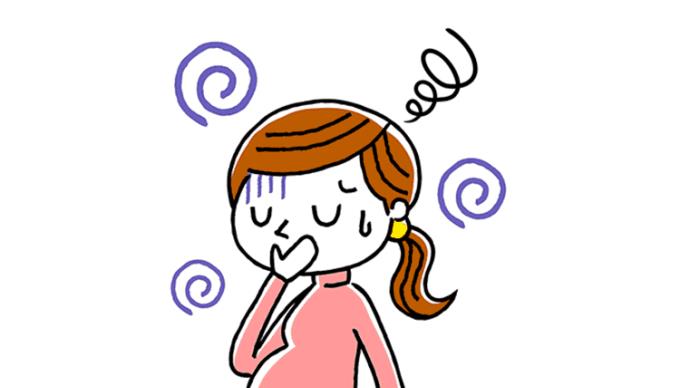Pregnancy is a special process that happens in a woman's life. During this time, your body has a lot of changes and you will experience feelings that you have never known before. Dizziness during pregnancy is one of the most common conditions pregnant women will experience.
A pregnant mother may feel lightheaded and dizzy if she gets up after bending down or after sitting for a long time. But why does pregnant woman get dizzy during pregnancy and how can this situation be resolved? Let aFamilyToday Health to learn more about the state of dizziness during pregnancy, causes, how to mitigate this situation as well as the time you need to find a doctor.
Pregnant mothers may experience dizziness during pregnancy at what stage of pregnancy?
You may start to feel dizzy around the sixth week of your first trimester . In some cases, you may still experience dizziness even into the second and third trimesters. Because then, the baby begins to grow rapidly and puts pressure on the blood vessels.
Is pregnancy dizziness a common early stage symptom?

During the early stages of pregnancy, pregnant mothers experience a lot of morning sickness and nausea. These symptoms often cause blood sugar to drop and cause loss of appetite, which in turn makes you dizzy.
What causes dizziness during pregnancy?
The cause of rapid pregnancy depends on the stage of pregnancy and may include various changes occurring in the body. During the first trimester, hormones and other changes in the body dilate the walls of blood vessels. This lowers blood pressure and makes you feel dizzy. Morning sickness also makes pregnant mothers feel tired and dizzy, because your body may not be able to absorb the necessary amount of nutrients through food.
During the second and third trimesters, blood volume increases by 30% as the fetus grows. This causes blood pressure to rise, which in turn leads to dizziness.
There are also other reasons why you may feel dizzy, such as:
• Dehydration and loss of appetite
• High body temperature
• Reduced blood sugar caused by gestational diabetes
• Pre-eclampsia you can get later in pregnancy
• Lying on your back in the last few months of pregnancy can put too much pressure on the blood vessels that carry blood from the lower body to the heart. This interferes with optimal circulation in the body and in turn causes dizziness.
• Hemoglobin, a protein responsible for carrying oxygen around the body, may not be able to meet it enough as your blood needs will increase. This can cause anemia, which makes you feel tired and dizzy.
• Spasmodic syncope can occur when the vagus nerve affects the circulatory system. You may faint or feel like you are about to faint.
When dizzy, how will pregnant mothers feel?
Some women may feel dizzy and tired. Others feel nauseous and dizzy or feel dizzy in a "spin around" type. At that time, you may experience visual changes such as dizziness or collapse, loss of balance.
What should pregnant mothers do when feeling dizzy during pregnancy?
Do these when you suddenly feel dizzy:
• Have someone open doors and windows immediately or go to well-ventilated areas.
• Sit slowly to avoid a sudden fall or, if possible, keep your head between your knees. Get up slowly, as sudden movements will worsen your condition.
• Try to lie on your left side. Doing so improves blood circulation to the brain and makes you feel better.
• Snacking and drinking some water or juice will help you to accumulate a lot of energy. This also helps you avoid the risk of dizziness caused by low blood sugar.
• Drink a lot of water.
• Take a cold shower if you feel lightheaded.
Method to help prevent dizziness during pregnancy
You can prevent frequent episodes of dizziness during pregnancy by following a few simple steps:
• Do not stand for too long. If you must stand for a long time, try to move often to help blood circulation better.
• Avoid sudden position changes, especially getting up while sitting or lying down, as sudden movement can make you dizzy.
• Eat regularly and avoid eating nothing for too long. This will help maintain your blood sugar.
• Don't lie on your back when you are in your second trimester.
• Do not shower with hot water.
• Wear loose clothing to help lower body temperature and increase blood circulation.
• Drink enough fluids to avoid dehydration.
• You should stay in cool and fresh places, this will help you control your own body temperature.
Pregnant mothers read more article Soak in a hot tub during pregnancy is safe? to update more useful information.
When does pregnancy dizziness usually end?
The dizziness usually lasts throughout pregnancy and will subside after delivery.
When should you see a doctor?
You don't need to worry too much if you experience dizziness from hunger, heat, sudden change of position, or convulsions. However, frequent or persistent episodes of dizziness should not be ignored.
See your doctor right away if you experience dizziness accompanied by the following conditions:
• Blurred vision
• Severe headache
• Palpitations
• Lisp
• Numbness
• Vaginal bleeding
• Chest pain
• Shortness of breath
• Stomachache
Also see your doctor if you experience dizziness with tachycardia and abdominal pain, as these could be signs of an ectopic pregnancy. Your doctor will conduct the tests and assessments necessary to monitor your health.
Learn about the symptoms of dizziness during pregnancy as well as ways to prevent and reduce it. If you've followed the above tips and still don't feel any better, see your doctor for treatment as soon as possible.












